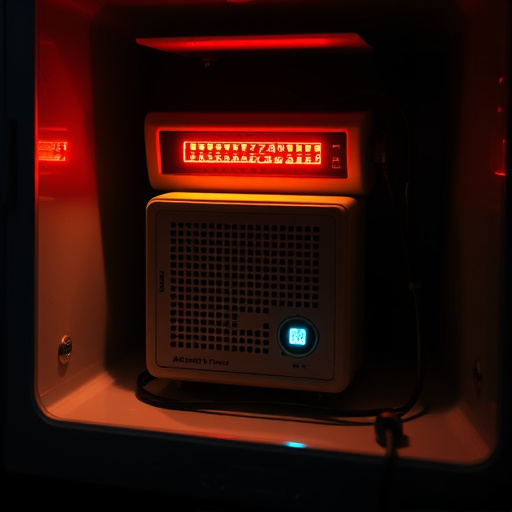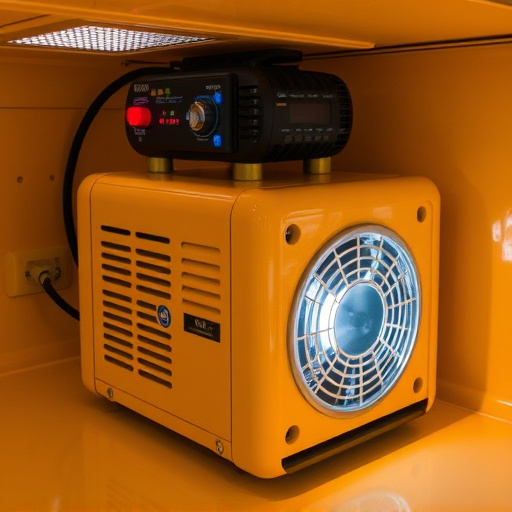Auxiliary batteries are indispensable backup power sources, crucial for maintaining continuity in remote locations and during emergencies like power outages. They ensure uninterrupted operations, protect sensitive equipment, and enhance safety across diverse scenarios, from off-grid living to critical industrial applications. Choosing the right auxiliary battery requires matching specifications with power demands, considering size, weight, and portability. Proper installation, regular maintenance, and informed selection are key to reliable backup power, making these batteries vital for enhanced resilience and business continuity in various sectors.
In today’s world, power outages are becoming increasingly frequent, highlighting the crucial need for reliable backup solutions. This is where auxiliary batteries step in as a game-changer. These power packs offer a plethora of benefits, from providing emergency lighting and powering essential appliances to supporting off-grid systems.
This article explores why investing in an auxiliary battery is a wise decision, delving into its advantages in diverse scenarios and offering practical guides on selection, installation, and maintenance for optimal performance.
- Understanding the Need for Backup Power
- Benefits of Auxiliary Batteries in Various Scenarios
- Choosing the Right Auxiliary Battery for Your Needs
- Installation and Maintenance Tips for Longevity
- Real-World Applications: Success Stories of Aux Batteries
Understanding the Need for Backup Power

In today’s digital era, our reliance on electronics is unprecedented. From smartphones and laptops to medical devices and emergency systems, power sources are integral to daily life and safety. However, traditional power grids are not always reliable, leaving individuals and organizations vulnerable during outages or remote locations without access to centralized electricity. This is where auxiliary batteries step in as a crucial backup power solution.
An auxiliary battery provides an additional energy source, ensuring continuity of operation even when the primary power fails. Whether it’s a car battery powering essential devices during a road trip or a home standby system keeping critical appliances running during blackouts, these batteries offer peace of mind and resilience. Understanding the need for backup power is paramount, as it allows for uninterrupted operations, protects sensitive equipment, and ensures safety in emergency situations.
Benefits of Auxiliary Batteries in Various Scenarios

Auxiliary batteries offer a multitude of benefits across various scenarios, making them an indispensable option for backup power. In remote or off-grid locations where access to main power sources is limited, auxiliary batteries ensure continuity in operations. Whether it’s powering essential appliances, lighting, or communication devices, these batteries provide reliable and stable energy supply.
In emergency situations, such as natural disasters or power outages, having an auxiliary battery can be a lifesaver. They enable critical equipment like medical devices, flashlights, and radios to function uninterrupted, enhancing safety and survival chances. Moreover, in recreational activities like camping or boating, auxiliary batteries facilitate a seamless experience by powering electronics and ensuring comfort and convenience away from conventional power outlets.
Choosing the Right Auxiliary Battery for Your Needs

When considering an auxiliary battery, it’s crucial to match its specifications with your power requirements. Start by assessing the voltage and amperage needed to run your devices. Different devices have varying power consumption, so choose a battery that can deliver the necessary amp-hours (Ah) to sustain your backup power for an adequate duration.
Size and weight are also essential factors, especially if you’re planning to use the auxiliary battery in a vehicle or while camping. Lighter, compact batteries are more portable but may have lower capacity, while larger ones offer higher energy storage but are less convenient to carry around. Compare various models, read reviews, and consider your specific needs to make an informed decision.
Installation and Maintenance Tips for Longevity

Installing an auxiliary battery requires careful planning and a solid understanding of your power needs. Begin by assessing your current energy consumption and identifying peak usage times. Choose a battery capacity that can comfortably handle these demands, ensuring it’s compatible with your existing electrical system. Proper installation is key; follow manufacturer guidelines rigorously to avoid short circuits or damage. Regularly inspect connections for corrosion or loose fits, cleaning them as needed.
Maintenance includes keeping the battery charged at optimal levels, typically between 12.6 and 12.8 volts for a 12-volt battery. Avoid deep discharge cycles by using power only when necessary. Periodically check fluid levels (if applicable) and top up with distilled water. Store batteries in cool, dry places, avoiding extreme temperatures. Regular servicing and adherence to these tips can significantly extend the lifespan of your auxiliary battery, ensuring reliable backup power for years to come.
Real-World Applications: Success Stories of Aux Batteries

Auxiliary batteries have proven their worth in numerous real-world applications, offering reliable backup power solutions. From remote construction sites to off-grid camping trips, these batteries provide a steady power source when traditional grids are inaccessible or unreliable. For instance, in mining operations deep underground, where power cuts can be dangerous, auxiliary batteries ensure continuous lighting and communication systems, enhancing safety and efficiency.
In the medical field, auxiliary batteries enable critical care units to maintain uninterrupted power during transport, ensuring life-saving equipment remains operational. This is particularly vital in remote areas or during natural disasters when hospitals might experience main grid failures. Moreover, these batteries support data centers by providing backup power, preventing downtime and potential data loss, which is crucial for businesses relying on continuous operations.
An auxiliary battery, a versatile solution for backup power, offers numerous benefits across various scenarios. From powering essential devices in emergencies to enhancing off-grid capabilities, these batteries provide reliable and efficient energy storage. By choosing the right model tailored to your needs and following proper installation and maintenance practices, you can ensure optimal performance and longevity. Real-world applications demonstrate that auxiliary batteries are game changers, revolutionizing how we manage power in today’s world.
